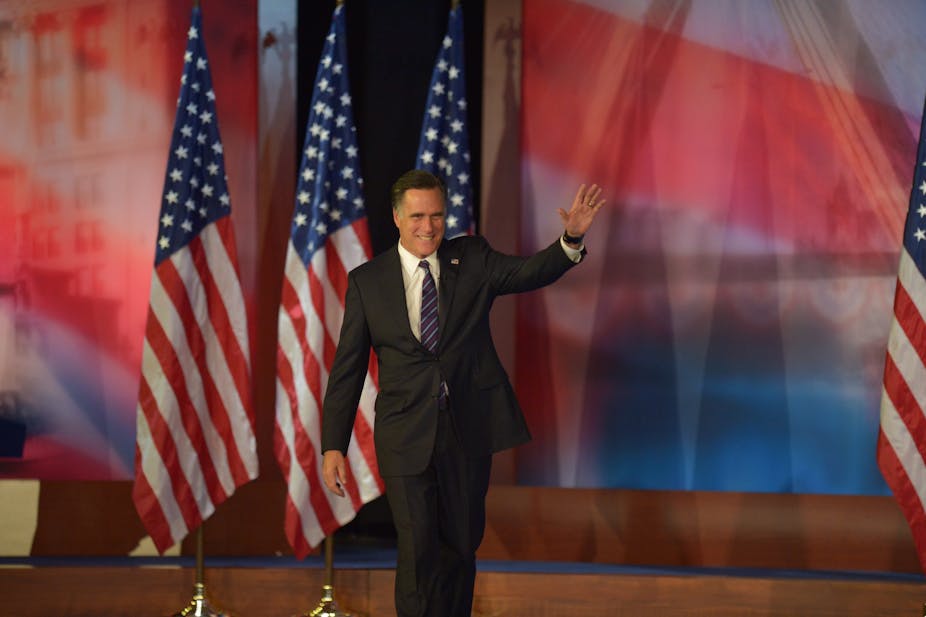This was Mitt Romney’s last best chance to be president of the United States of America.
Romney had a relatively easy primary contest. All the other Republican candidates shot themselves in the foot by either being philanders, dullards or unhinged partisans. Although the conservative base of the GOP desperately wanted someone – anyone – besides Romney, he was the last candidate standing.
Then, in the general election, Romney had most things working in his favour. Key structural features were all working with him. Since 2007, the US economy has only grown 1.75%. Unemployment remains stubbornly high at 7.9%. It has been repeated innumerable times this election that, since the Great Depression, no US president has been re-elected with unemployment this high. American servicemen are still regularly being killed in Afghanistan and the “fiscal cliff” is looming. Not surprisingly, all the polling from the major news agencies report that most Americans believe that the country is on the wrong track.
How could he have possibly lost?
Apologists for Romney will say that this presidential election’s “October Surprise” was Hurricane Sandy, which favoured the incumbent. They will say that Romney was closing on President Barack Obama before the hurricane caused the campaign it shutdown for a crucial 48 hours. Romney’s friends, such as New Jersey Governor Chris Christie, did not help matters by heaping praise on the president’s response to the freak storm.
This version of history is extremely favourable to Romney. The truth is that he was behind before the hurricane and remained behind afterwards.
Romney lost because he was a weak candidate. In a stronger field, he probably would not have made it out of the Republican primaries. Romney ran on three pillars: as an experienced businessman; as the former governor of Massachusetts; and as a conservative family man. It could be argued that each of these was a greater weakness than strength.
Romney’s business experience was supposed to be his greatest asset. However, his time at Bain Capital also made him an easy political target. For sure, he was responsible for hiring people, but he was also responsible for firing people. The people he tended to hire were finance people. The people his company laid off tended to be lower skilled workers. These workers are the exact people he needed to convince to vote for him.
Indeed, with unemployment at 7.9%, many Americans recognise Romney as the boss who recently fired them. It was also easy for Romney’s political opponents to associate Romney’s business experience with the worse excesses of Wall Street and outsourcing of jobs to China. As such, the businessman theme failed to achieve as much traction as campaign strategists probably would have wished.
Romney also drew heavily upon his experience as Governor of Massachusetts, particularly during the presidential debates. This is understandable as it was his only real political experience. Once again, however, this experience worked against as much as for him.
When Romney entered the governorship, he balanced the budget by increasing taxes and decreasing expenditure. When running for the presidency, he said he would never raise taxes to balance the books. He also introduced a comprehensive health care program, which is very similar to “Obamacare” he later riled against in the presidential campaign. He assumed relatively progressive social positions on gay rights and abortion, but later called himself a “severe conservative” in the Republicans primaries.

Politicians regularly shift their positions. Few have attempted it to such an extent as Mitt Romney – from the relatively progressive positions of his governorship, to the conservative positions of the primaries to the middle for the general election.
Finally, Romney ran heavily as a stable, conservative family man. Yet, this picture also reminded many Americans that Romney is a Mormon. There remains a great deal of prejudice against Mormons in the United States. Many evangelicals disbelieve that they are even true Christians. Many of the left also hold negative views of Mormonism after the church played a prominent role striking down marriage equality acts across the country, including overturning laws in California. Politically, Romney’s religion worked against him on both his right and left flanks.
What next for Romney?
There has been speculation that Romney may run again in 2016. This narrative follows that he has gotten so close that he can almost taste the White House. There is no precedent for this. Dole didn’t run in 2000. Gore didn’t run in 2004. Kerry didn’t run in 2008. McCain didn’t run this time.
While holding this in mind, it is too early to write Mitt Romney’s political obituary. I don’t think we have seen the last of him.

